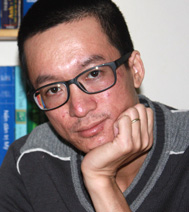
Nguyen Dac Kien
By Chris Brummitt
THE Associated Press
HANOI, Vietnam (AP) — Vietnam’s leaders sought to boost their flagging legitimacy by asking the public for suggestions on constitutional reform. What they got instead was rare open criticism of one-party rule, a fired journalist turned poster boy for dissent, and another lesson on how the Internet has changed the rules of governance.
The flurry of criticism has put Communist Party chiefs on the defensive, upping the pressure on them amid widespread discontent over high-level corruption and a stuttering economy. Those behind the outpouring — a grouping of intellectuals and former officials — say they have no intention of shutting up.
“Many of our fellow countrymen and soldiers have sacrificed themselves to build this current regime,” said Le Hieu Dang, former vice chairman of a Communist Party-run organization in Ho Chi Minh City. “Going against the rights of the people can’t be tolerated after the blood that has been shed.”
Dang and 71 others released their own proposed constitution on the Internet in response to the government’s request for public comments on its draft. They also handed a copy to the committee in charge of revising the constitution, which is being amended for the first time in 20 years.
Their version removes Article 4 — which stipulates that the Communist Party is the sole political force in the country — and calls for other things anathema to ruling officials, such as free elections and free media. It spread quickly on blogs in a country where more than one-third of the 87 million people are online, sparking more debate.
The head of the committee revising the constitution said they had gone too far.
“Abusing the garnering of ideas on the revised constitution to propagandize and lobby for the people to oppose the party and the government … must be resolutely prevented,” Nguyen Sinh Hung said in a meeting shown on state-owned television Wednesday night.
The government asked for suggestions on the proposed constitution revision in January, saying people would have three months to do so and opening up a comments page on its website. The 72 petitioners used the opportunity to test the limits of the government’s willingness to debate. More than 6,000 people have since stated their support for the group’s version online.
“We need to have open discussions. Why are their ideas published in the state media, but not ours?” Dang said by telephone from Ho Chi Minh City. “We use the Internet.”
Vietnam opened up its economy in the 1990s, but retains a closed political system that rarely allows dissent. Long prison sentences are common for dissidents. The Internet has opened up new avenues for those who oppose the government, or discuss alternative ways of governance. Within the party, there are also tensions between the old guard and progressives. They too find their way onto blogs.
On Tuesday, journalist Nguyen Dac Kien was fired by his state-run newspaper after he blogged about an attack by the Communist Party chief on those calling for greater constitutional reforms. It’s made Kien into something of a hero for those who oppose the government.
While the government’s grip on power is secure for now, the flowering of open political discussion could deepen a sense of crisis within the ruling elite.
“The party leadership has lost control over the discussion. Like it or not, there is in Vietnam a debate on the constitution, with even longtime party members weighing,” said Jonathan D. London, a Vietnam expert at the City University of Hong Kong. “Bottling it up at this point will be no easy task.”
The government is revising the constitution for the first time since 1992, citing the need to speed up the country’s development.
The most significant change in the draft on the government’s website is the removal of a stipulation that the state sector “plays the leading” role in the national economy. That suggests that the government may dismantle corruption-riddled and unproductive state-owned enterprises that eat up much of the national budget and have been blamed for the current economic difficulties. (end)


